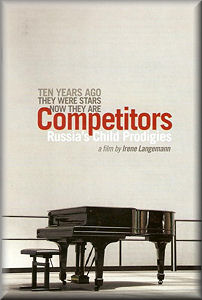 |
 |
|


CD: MDT
AmazonUK
AmazonUS
|
Competitors - Russia’s
Child Prodigies
A Film by Irene Langemann
 with Irina Chistyakova, Nikita Mndoyants, Dmitry Krutogolovy and
Elena Kolesnichenko
with Irina Chistyakova, Nikita Mndoyants, Dmitry Krutogolovy and
Elena Kolesnichenko
NTSC: 16:9, Sound; PCM Stereo – Dolby Digital 5.1; Languages; English,
German, French, Russian; Region Code: 0
 EUROARTS
EUROARTS  2057418 [98:00]
2057418 [98:00] 
|
|
|
The cover blurb of this DVD instils a sense of incipient tension.
One can even imagine the cinematic voice-over artist, gruff,
guttural, theatrically ponderous in his delivery, as he says:
‘Ten years ago they were Stars; now they are Competitors’. The
title seems, indeed, on reflection, to collude in the very humiliation
to which some of these musicians are subjected during the course
of the documentary film. The relish with which the combative
is set up and asserted, the glee with which it is heralded on
the cover, strikes me as not simply misplaced, but in some ways
cruel.
Doubtless Irene Langemann would retort, as with the ‘Isherwood’
character in his Berlin stories, that she is just a camera,
recording. Maybe. But it strikes a wrong note, one to which
I draw attention at such length because I found one scene in
the film distressing, and the remembrance of that scene – where
one of the four musicians weeps after a humiliation at a Vienna
piano competition – still sticks in my mind’s eye.
The film follows the lives and careers of four young pianists,
of varying ages, all of whom were filmed a decade back in a
similar film about prodigies, the 2000 documentary ‘Russia’s
Wonder Children’. This has a socio-educational feel, analogous
to BBC documentaries along similar though less specific lines,
in which children are ‘followed’ from their early years to maturity,
over five or ten year periods.
The film opens well; each musician plays in shadowy light, the
same piece. All four pronounce themselves disgusted by their
playing. The grins are genuine, the self-criticism quick and
instinctive. There are a number of themes; finding a manager
or agent; competitions; engagements; composing one’s own pieces;
the balance of the sexes when it comes to concert pianists;
the decision to marry and have children; the necessity to teach;
the constant pressure of such a life; the hope that their careers
will prove lasting and fulfilling.
All agree that competitiveness at the Moscow Conservatoire was
inbuilt, pervasive and intense. And we watch them as they criss-cross
Europe in search of competitions, big and small, at which to
parade their wares. To win a competition, as we know, or at
least spectacularly not to win a competition, ensures column
inches of publicity, and that means eager managers. Irina Chistyakova
is eventually voted off a smaller competition but her potential
is spotted by a conductor who condemns the result vociferously.
He’s only identified later as Enrique Batiz, and he invites
her to Mexico to perform with his orchestra, a performance which
we see. The serendipitous nature of this contact reinforces
one’s view of competitions as a mixture of blind date and blood
sport.
It is Elena Kolesnichenko whose visit to the Beethoven Competition
in Vienna leads to such anguish. She feels she has never played
better but is eliminated in the first round. It is ‘a racket’.
Back in Hanover, where they live, her husband tries to console
her as she weeps, and the camera lingers. Strangely, and soon,
letters arrive from disgruntled jury members claiming they had
voted for her, and that she was voted off so early because she
was seen as too strong a competitor. The implication is clear.
A judges’ favourite must win. It’s hardly a novelty in the competition
circuit, but when one sees the human consequences, it condenses
this objectionable practice.
The pervasive feelings that one draws from this film are the
arbitrary nature of ‘success’, and the treadmill that leads
young musicians toward it or ever further from it; the difficulties
of life as a soloist with family commitments; the corrosive
nature, but also the pleasures of, teaching; the crudeness of
managers and agents in their milk-round of young talent. I must
say, despite the successes that are duly welcomed, the film
left me pretty pessimistic. And, in any case, if that’s what
happens to young pianists, what chance old bald guys in their
forties?
Jonathan Woolf
|
|

